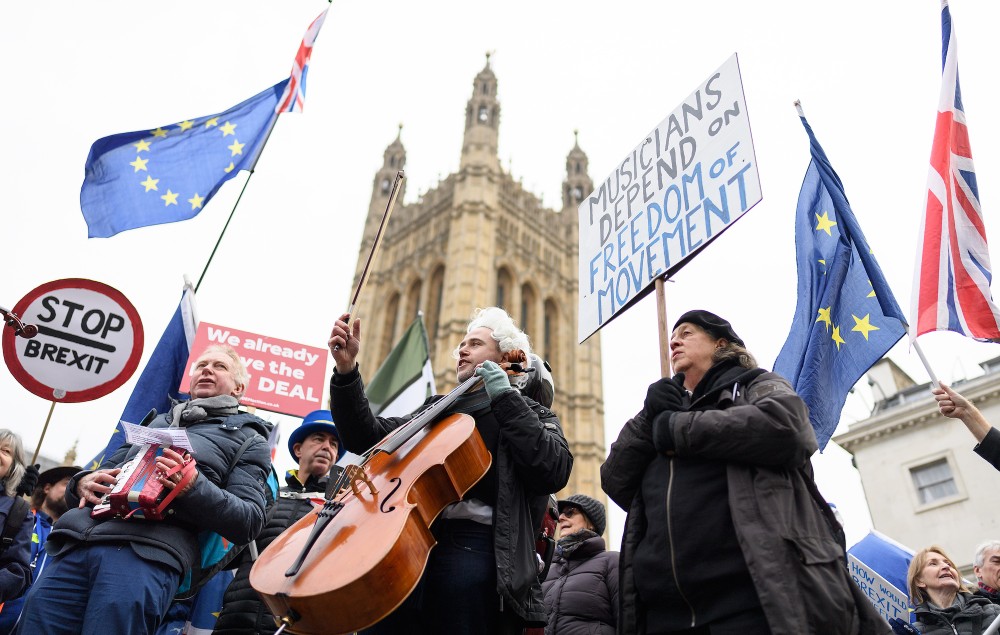European promoters say Brexit touring mess is “quite worrying” and that “effort should come from the UK”
European venues and gig bookers have spoken out about the potential impact of the ongoing Brexit touring row, and what it could mean for their chances of booking emerging UK bands.
In failing to negotiate visa-free travel and Europe-wide work permits for musicians and crew, the current problems that surround post-Brexit touring stand to be far-reaching. Beyond the fears that the new added huge costs to future live music tours of the continent will prevent rising and developing artists from being able to afford to do so, it is also warned that a great deal of jobs and income for crew, haulage and production will be lost.
After European festival bosses said that the extra complications could see them booking fewer rising UK acts, now grassroots venues from the EU have spoken to NME about the best ways to help artists tour across the channel.
Audrey Guerre is from the LIVE DMA, the European equivalent of the Music Venue Trust, providing support and advocacy for grassroots venues across the continent. She said that EU venues were still keen to book UK talent, but that there were many hurdles to overcome.
“It seems that the fact there is no deal for the UK cultural sector does not affect the willingness of European venues to programme UK artists,” she told NME. “Most of the programming is on pause due to COVID, but it’s very difficult for venues to measure what the impact of Brexit will really be.”
She continued: “It’s quite worrying. We’re still in the middle of a crisis, so it’s already difficult to see a way out. If you put Brexit on top, it’s even more difficult to imagine what tours might look like in a year.”
“What we do know for sure is that European venues are aware that there will be more of an administrative burden to book UK artists, but in a way, they’re already dealing with that for artists from outside of the EU such as America and Australia.”

Guerre said that with the rules changing from country to country, the extra paperwork and complications are likely to have the most impact on smaller UK acts without the support network around them to deal with it.
“The barriers will be on the visas and work permits,” she said. “If the responsibility of these falls on the live venues, then it might be difficult for some of them to get it. We’ve also heard that social security could mean increased fees of up to 60 per cent in Italy. That would make it much more expensive to book UK artists. If the venue doesn’t have more income to do so, then that will be a barrier.
“It’s always the same dynamic with these things – it increases the gaps and fragmentation of our sector between the smallest and the biggest acts. We’re quite concerned about emerging artists, their staff and the music venues. This administrative burden will not help in booking emerging artists.”
Asked what the ideal solution to these problems would be, Guerre replied: “Having a deal at European level would harmonise things a lot for organising tours, at least to get some rules for visas, work permits, VAT and social security.”
“Artists will probably have to be patient for a few months as we’re stuck in this situation at the moment, but I’m quite confident that we’re in a very creative industry. Music has no frontiers, so we’ll find a way to overcome this.”
View this post on Instagram
Geoffrey Vasseur runs popular Berlin venue Yaam and told NME that the Brexit outcome won’t stop him from booking UK talent – but that the added expense and paperwork would have to be taken on by someone else.
“I’m sorry for all the artists but I don’t think it’s going to have such a devastating impact in terms of who we book,” he said. “We’ve come to the conclusion that if you want to book an artist, then we just will. If the agencies or the bands themselves manage to get their paperwork then it doesn’t make much difference to any other non-European artist.
“I do see the fees getting higher for bands coming from England. We’ll go with that as long as it’s reasonable. It won’t be possible to expect the promoters and venues in Europe to absorb these costs. That just won’t work. At the end of the day, it’s not our fault.”

With it seeming increasingly unlikely that the UK will return to the negotiating table to find a Europe-wide solution with the EU, Vasseur suggested that the UK set up a body specifically designed to help artists tour and promote their work overseas.
“Maybe it’s time for the UK to create an agency to take care of that and promote UK bands outside of the UK like they have in Germany and Norway – they could help with the visa stuff too,” he told NME. “It’s a shame that the Brexit deal doesn’t mention music or culture in any way, but there’s a need to advocate this and address the issue.”
He added: “The effort should come from the UK, and it should come from some kind of organisation that could organise musicians. There’s nothing that European promoters or venues can do about it, so I’d suggest that the UK gets organised.”
David Martin, CEO of the UK’s Featured Artists Coalition, agreed that it would be in the government’s best interests to set up such a body.
“In the short term, and to avoid a cliff edge following Brexit, the government must back a UK music export office while it works on longer-term, sustainable solutions,” Martin told NME. “An office which is jointly operated by the whole industry and by government will be essential to support artists in navigating the new challenges they face across the live and the recorded aspects of their careers.
“This is particularly important for our breakthrough talent, who will become our superstars of tomorrow.”
As anger continues to grow around the handling of the Brexit touring row, this week saw culture ministers questioned by MPs over how it came to this and what’s to happen next.
While admitting that there were no plans to renegotiate these terms with the EU, the government were criticised for not yet being in talks with individual countries and having no idea of the potential financial damage that Brexit could cause to the music world, as well as facing accusations of treating the UK’s £111billion culture industries as “an afterthought” and putting more onus on the £5.2billion fishing industry in the deal.
